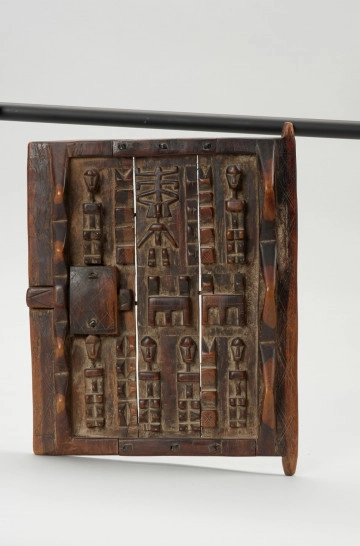
Figure - woman
między 1976 — 1984
National Museum in Szczecin
Part of the collection: Collection of Dogonian art
In the Dogon country, hoe-farmingis the basis of the traditional economy. Every, even the smallest, piece of land is used for cultivation in the rocky cliffs, where terraces are created which are protected against a landslide by stones. The Dogon usually grow millet (yu), sorghum (eme), fonio (po), beans (nu), maize (ga) and peanuts (elie). Farming involves all healthy family members. Men and women do the heavier work, the elderly and children the lighter work. The Dogon believe that the effort put into cultivating the fields is not enough to ensure a good harvest. Effective protection from pests and thieves and a guarantee of the best growing conditions for the plants are to be ensured by the altars and fetishes erected in the fields. These take various forms, they can be stones, clay fragments of old vessels, carved stone and wooden figures. Such an object acquires its power only after sacralisation, which involves making offerings, usually of millet flour mixed with water, and uttering words of prayer. It is interesting to note that the earth fetish presented here was made from an old, worn out pestle for beating onions, which is now the main export product of the Dogon. It is sold in the form of balls formed from the green stalks of chives or as onions themselves without juice, which is removed using a pestle with a wide beating part. Thanks to the removal of the juice, the onion balls do not spoil and retain their flavour for a very long time. They can be found in many markets in the Republic of Mali.
Ewa Prądzyńska
Author / creator
Dimensions
cały obiekt: height: 40,6 cm, width: 11,8 cm
Object type
sculpture
Creation time / dating
Creation / finding place
Identification number
Location / status

unknown
między 1976 — 1984
National Museum in Szczecin

unknown
między 1951 — 2000
National Museum in Szczecin

unknown
między 1951 — 1989
National Museum in Szczecin
DISCOVER this TOPIC
Castle Museum in Łańcut
DISCOVER this PATH
Educational path
0/500

We use cookies to make it easier for you to use our website and for statistical purposes. You can manage cookies by changing the settings of your web browser. More information in the Privacy Policy.
We use cookies to make it easier for you to use our website and for statistical purposes. You can manage cookies by changing the settings of your web browser. More information in the Privacy Policy.
Manage cookies:
This type of cookies is necessary for the website to function. You can change your browser settings to block them, but then the website will not work properly.
WYMAGANE
They are used to measure user engagement and generate statistics about the website to better understand how it is used. If you block this type of cookies, we will not be able to collect information about the use of the website and we will not be able to monitor its performance.